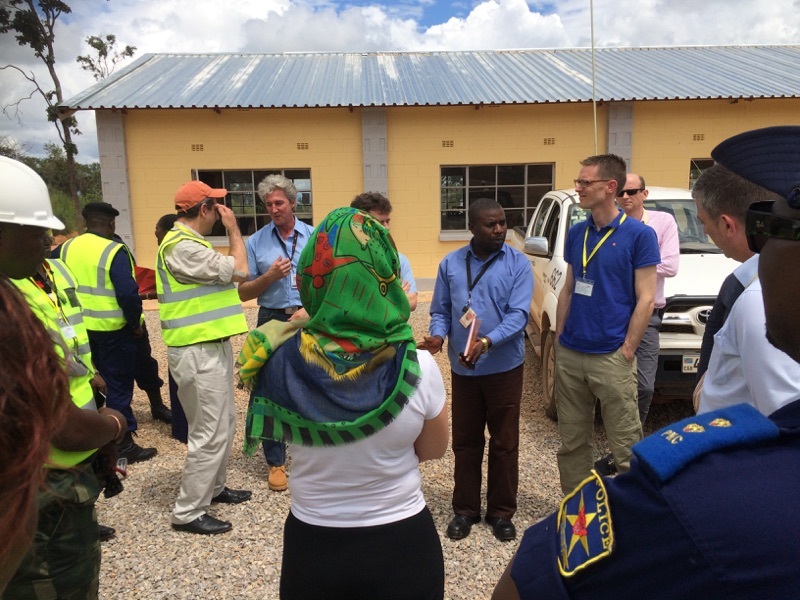A Tale of Three Cities


A Board delegation visits a school close to the Katanga mine in Lubumbashi, DRC. Image: EITI International Secretariat.
This week promises to be a monumental one for the EITI. The Board will meet in Brazzaville as part of a wider programme including training for Francophone African countries, discussions on the role of EITI to advance good governance of national oil companies and of artisanal and small scale mining, and a raft of meetings with key stakeholders in the processes in Congo-Brazzaville and the DR Congo. The Board itself is due to discuss its strategy over the next 3-5 years, as well as key country decisions on Afghanistan, Azerbaijan, and Tajikistan. The programme is intense and, we hope, timely.
Today saw the Board spread across three cities prior to the beginning of the Board meeting on 14 April. A delegation of Board members, including Clare Short, travelled around Lubumbashi. National coordinators and communications officers from EITI secretariats in 12 francophone countries (with another two delayed) met for the first day of training in Kinshasa. Civil society met all day in Brazzaville.
Lubumbashi – EITI at the cobalt-face
“It is far from perfect, but we are making steady progress on multiple fronts. From beneficial ownership disclosure and license and contract allocation to the publication of more figures to inform the public on the resources of our country”. This is how Prof Mack Dumba, National Coordinator of EITI DRC, opened a meeting with the Chair of the EITI Board Clare Short at the local EITI secretariat in Lubumbashi on Sunday under flickering light, due to instable electricity supply. Clare and the delegation learned how the staff are fighting an uphill battle against an endemic corruption and deep rooted bad governance practices that have plagued the development of the country for decades.
The visitors were told how the team goes from company to company to collect payments figures to the state that they will then match with revenue figures declared by government agencies. Based on this, they figure out whether companies have paid their dues and whether these revenues went to the state coffers, instead of in government official’s pockets.
The Board delegation met representatives from 25 companies members of the Katanga chamber of mines, which is playing an active role in the implementation of the EITI process. Many of the company representatives expressed their desire to see improved government accountability.
The Board delegation also met with a group of civil society representatives from Katanga and the Province Oriental, in a room that had served as a venue for intense debates on important issues for EITI-DRC National Committee, including a better understanding of the arrangements of the Sicomines project.
At the Tenke Funkurume mining site, which is the world’s largest producer of cobalt, the Board met with local communities, including those who had been relocated by the company. The Board visited schools and hospitals built and sponsored by the company as part of its relocation project.
Kinshasa – EITI peer learning in action
Bringing together National Coordinators and Communications Officers from 12 francophone African countries in one room was always going to yield engagement and peer learning. Today’s proceedings in Kinshasa fitted the bill, as conversations around different contexts in the 12 countries catalysed some common challenges and priorities. Mining Minister Martin Kabwelulu’s opening speech in the morning reflected the DR Congo’s strong support for this peer learning.
The session on workplans focused on broader themes of how to make the EITI relevant for popular public debates and an instrument for reinforcing government data collection systems. These are clearly very different countries. The priorities in the Central African Republic are clearly not the same as those in Senegal. Yet implementing countries can choose from the Standard’s encouraged elements to fit their needs and specific contexts.
The session yielded fascinating differences in perspectives on the role and mandate of the EITI in each country. What is the role, the strength and the mandate of the EITI in a specific country? Where does it stand on the spectrum between collecting, presenting and monitoring information and holding parties to account? Participants were invited to focus on the most pertinent elements to their situation – or “scratch where it itches” rather than data for data’s sake.
The session on data brought forward different approaches from the US and the DR Congo, demonstrating distinct sections of the data value chain. The US-EITI data is available online through an innovative searchable portal. The US Secretariat is working to segment information to meet the needs of the various types of consumers using the USEITI site, providing a pertinent example of the need to assess demand for data, and to segment the audience. The DRC-EITI’s e-reporting system was launched to improve efficiency of data collection and reconciliation. At some upfront cost, the DRC’s system has saved some three quarters of the time usually needed for the reporting process and looks set to pay for itself over time.
The group breakout session on report analysis turned the tables, with participants taking on the role of validators and assessing each other’s reports.
Brazzaville – preparing the ground
Civil society were the first to gather in Brazzaville ahead of the Board meeting on Tuesday and Wednesday. By the evening, all Board members had arrived – albeit on delayed flights and tortuous routes. The implementing and supporting government constituencies met in the evening to prepare for the days ahead.
Stay posted for our daily blog from the EITI week in the Congos.